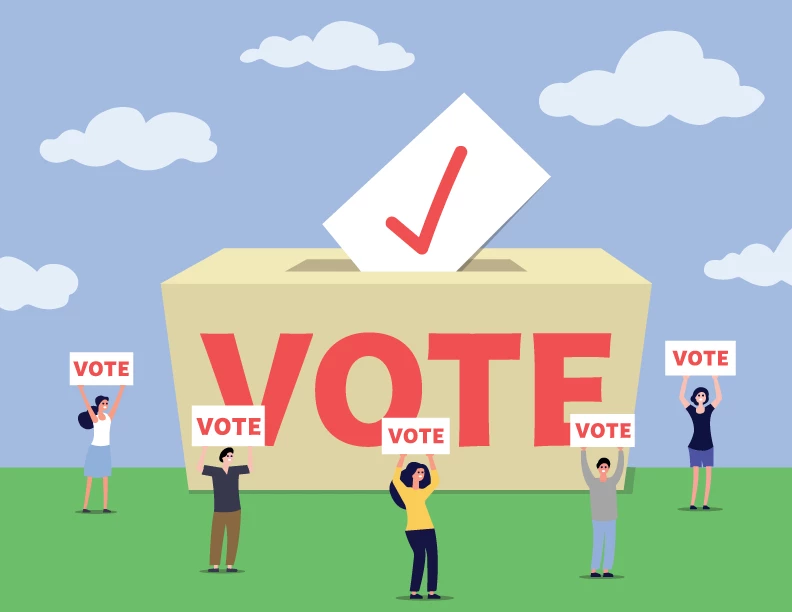New research demonstrates how voting methods influence group decision-making
Expecting to join CPTPP, UK businesses increase interested in Vietnam / Vietnam and Thailand anticipate 25 billion USD in bilateral trade
In a study published in Academy of Management Discoveries on September 28th, researchers discovered that groups using "multivoting" in unofficial votes were 50% more likely to select the correct option than those using plurality or ranked-choice voting.
Multivoting provides voters with multiple votes to distribute across all options. "American Idol" utilises multivoting, granting each fan ten votes. They may cast all 10 votes for their favourite contestant or divide their votes between two or more contestants. Students were given 10 votes to distribute among three options in this study.
In political elections, plurality voting, in which voters must select one option, is most commonly used. Increasingly popular in some local and state elections, ranked-choice voting allows voters to rank their preferences from first to last. In addition, it is used to determine Academy Award winners.

New research demonstrates how voting methods influence group decision-making (Illustrative image).
Michael Johnson, co-author and professor of management at the UW Foster School of Business, stated that multivoting is most beneficial for groups that want to make the best decision possible. The researchers do not believe it would work for political elections due to the difficulty of allocating votes across multiple options.
Johnson stated, "We view multivoting as primarily useful for workplace decision-making groups." "Wherever groups believe it will be crucial to make the right decision, use multivoting as an unofficial vote, examine the distribution, and then discuss. It works when people are motivated to vote in accordance with their true beliefs, as opposed to voting strategically to oppose another candidate."
The study at the University of Washington was based on the "pursuit teams" created by the Department of Homeland Security after 9/11. The objective was to integrate the findings of multiple intelligence agencies in order to track potential terrorist threats.
In this study, 93 groups of undergraduate students were asked to simulate counterterrorism support teams and determine which of three suspects posed the greatest threat. The student groups were provided with information on three terrorist suspects, but no group member had complete information on any one suspect. Students were required to share information in order to correctly identify the greatest threat.
The teams were divided into three equal groups using ranked-choice voting, plurality voting, and multivoting. Each group conducted a preliminary, unofficial vote to gauge the initial opinions of its members regarding the terrorist suspects. Following the unofficial vote, they discussed the results and suspects. If students combined the information effectively, they would be able to determine which terrorist posed the greatest threat. The teams then provided their final decision.
In the final vote, only 31% of plurality teams selected the most dangerous suspect, roughly the same as if it were left to chance. 6 percent of teams in the unofficial vote had a majority of members correctly identify the suspect. This is lower than the 11% chance would have predicted.
Voting by ranking did not fare much better. 32% of teams identified the correct suspect in the final vote. In 7% of groups, a majority of members ranked the right suspect as the most dangerous in an unofficial vote.
Johnson stated, "We were surprised that the ranked-choice groups did not outperform the plurality groups." "There is substantial evidence, particularly in contemporary politics, that ranked-choice voting produces outcomes that are more consistent with voter preferences than plurality voting. Because of this, so many political elections have adopted ranked-choice voting.
"However, ranked-choice voting is generally more effective at revealing people's true preferences than determining the exact correct answer. When making decisions at work, it is more important to get it right than to ensure that it reflects the opinions of everyone.
The multivoting groups began stronger, with the majority of members in 30% of groups selecting the most dangerous suspect. In the final vote, 45 percent of teams correctly identified the most dangerous suspect.
Researchers found no evidence that discussions in multivoting groups differed significantly from discussions in the two other voting conditions. Instead, the advantage of multivoting occurred prior to any discussion, as students processed the information more thoroughly and evaluated the intelligence with greater scrutiny.
Johnson stated, "The real discovery, and something we did not expect, was that multivoting groups were more accurate before they discussed." "We simply assumed they would be roughly equivalent prior to the discussion and then improve at the conclusion. If people have the option to say, "I kind of like Option A, but I also kind of like Option B," it may prompt them to think more before engaging in discussion, thereby facilitating the correct decision.
Eli Awtrey of the University of Cincinnati and Wei Jee Ong of the National University of Singapore were also co-authors.
Journal Reference: Michael D Johnson, Eli Awtrey, Wei Jee Ong. Verdicts, Elections, and Counterterrorism: When Groups Take Unofficial Votes. Academy of Management Discoveries, 2022; DOI: 10.5465/amd.2021.0099
End of content
Không có tin nào tiếp theo



